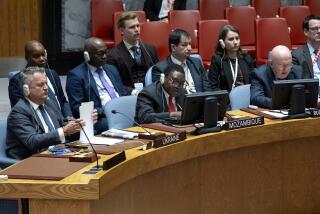Bosnia War Crimes Dispute Divides Security Council
- Share via
UNITED NATIONS — Reflecting its ambivalence about the value of its hunting down war criminals, a deeply divided Security Council has failed for a month to elect a prosecutor for the new international tribunal on war crimes in Bosnia-Herzegovina.
To shake the council into action, Secretary General Boutros Boutros-Ghali on Aug. 26 officially nominated Cherif Bassiouni, 57, an Egyptian-born American law professor.
But the matter was regarded as so delicate and controversial that the nomination was not made public. U.S. Ambassador Madeleine Albright, the council president in August, decided to leave the nettlesome issue for her successor, Venezuelan Ambassador Adolfo Taylhardt, September’s council president. So far, the nomination has been neither confirmed nor rejected.
Bassiouni, who has taught criminal law at the DePaul University law school in Chicago for 30 years, is evidently regarded by some opponents as likely to use the prosecutor’s podium to publicly lambaste suspected Serbian war criminals, even when he knows he cannot bring them to trial.
This prospect upsets those who feel the peace process could be hurt if a barrage of war crimes charges infuriates Serbian leaders and negotiators.
The controversy over a prosecutor mirrors the controversy over the tribunal itself. Many outsiders doubt that the tribunal, created by the Security Council and based in The Hague, will ever hold a trial, because most of its suspects belong to forces winning the war. Other critics insist that the United Nations should stop the war crimes, not fret about bringing criminals to justice in the future.
Edward C. Luck, president of the private U.N. Assn., likens the tribunal to a referee at a soccer game “who says, ‘I will take notes over the course of the game about who has committed flagrant fouls and, after the game is over, I will tell you who they are, but I won’t interrupt the game and change the course of the game.’ ”
The controversy over the prosecutor emerged early in August when Boutros-Ghali sent an informal letter to the council asking for a reaction to three possible candidates: Bassiouni, who has spent six months as the key investigator for the U.N. War Crimes Investigation Commission gathering evidence on crimes in the Bosnian war; John Duncan Lowe, the attorney general of Scotland, and Amos Wako, former attorney general for Kenya.
Albright did not call the council together in private for a formal vote. Instead, she canvassed each ambassador separately.
At the end of this straw poll, she found that seven governments--the United States, Japan and the five nonaligned governments of Venezuela, Morocco, Pakistan, Djibouti and Cape Verde--supported Bassiouni. Seven governments--Britain, France, Russia, China, Spain, New Zealand and Hungary--supported Lowe. Brazil voted for Wako.
Albright evidently did not try to lobby for Bassiouni. The Clinton Administration decided, a State Department spokesman said, “that a consensus is critical to ensuring that the tribunal is established on a firm basis.” Albright joined other ambassadors seeking a compromise candidate.
But it was not up to the council to hunt for a compromise candidate. Under provisions of the resolution setting up the tribunal, the secretary general has sole authority to nominate a prosecutor, whom the council would confirm or reject. After learning of the 7-7-1 stalemate, Boutros-Ghali shocked ambassadors by formally nominating Bassiouni.
In some ways, it was a natural choice for the secretary general. A former deputy foreign minister and professor of international law in Egypt, Boutros-Ghali knew Bassiouni in Cairo even before the professor immigrated to America in 1962. More important, Bassiouni had already marshaled evidence for possible prosecutions in six months on the investigating commission.
But Boutros-Ghali’s official blessing did not change the views of ambassadors opposed to Bassiouni and did not persuade the Administration to lobby hard enough to assemble the nine votes needed to approve the professor.
As State Department spokesman Mike McCurry told reporters Thursday, “The United States is actively consulting with other members of the council to identify an acceptable candidate who will be fully qualified and will actively prosecute cases brought before the tribunal.” This implied that the United States was dropping Bassiouni and looking for someone else.
But an official rejection of Bassiouni would amount to a public rebuke of Boutros-Ghali. Albright and the other ambassadors obviously would prefer that he submit a new candidate with tacit council pre-approval.
More to Read
Sign up for Essential California
The most important California stories and recommendations in your inbox every morning.
You may occasionally receive promotional content from the Los Angeles Times.













